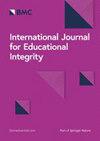细节中隐藏着魔鬼——把针对阿联酋高等教育学生的独特和有机的合同作弊网站计算在内,以此呼吁将其合法化
IF 6.9
Q1 EDUCATION & EDUCATIONAL RESEARCH
International Journal for Educational Integrity
Pub Date : 2022-09-01
DOI:10.1007/s40979-022-00114-z
引用次数: 0
摘要
在考虑高等教育的范式转变时,必须把重点放在消除阻碍保持学术界诚信的障碍上。其中一个障碍是合同作弊网站,这些网站在18个月的紧急远程教育期间不成比例地迅速增长,威胁到研究生的质量和大学的声誉(McKie, Essay mills瞄准学生,因为流行病危机转移了HE online, 2020)。2015年,由于涉及16所大学和1000多名学生的大规模丑闻,澳大利亚随后通过了一项法律,将此类服务定为非法,这一丑闻成为人们关注的焦点。合同欺诈是一个迅速发展的行业,经常以合法帮助为幌子,针对毫无戒心的学生。此外,这些服务在提供服务后,反过来又开始向学生发送黑色邮件(Draper等人,Int J Educ integri 17:13, 2021)。因此,探索针对阿联酋学生的此类网站的存在和数量至关重要,有时使用大学标志来显示合法性,以了解问题的严重程度。这主要是因为目前还不存在对程度的准确测量(Newton, Front Educ 3:67, 2018)。柯蒂斯等人(Stud High education)。https://doi.org/10.1080/03075079.2021.1972093, 2021)报告了学生自我报告的病例,这些病例可能各不相同,而且往往报告不足。这项研究是一个尝试使用布尔搜索技术来计算独特的和有机的网站已经表现。编码分析用于整理网站并计算总搜索次数。在34个独特和有机网站中,有29个网站的z得分高于平均值2.94,标准差为1.89,假设这29个网站在不同的搜索引擎、不同的浏览器和不同的搜索关键词中出现的概率是显著的。这表明了这些网站的侵略性,以及他们为提供对学生和教育部门有害和有害的服务所做的巨大努力。这项研究是发展阿联酋全国范围内对合同欺诈理解的一个里程碑。它还被定位为全国高等教育可持续发展的一项提案,旨在禁止为学生提供有偿或无偿的作业服务,作为一种自上而下的解决问题的方法。本文章由计算机程序翻译,如有差异,请以英文原文为准。

The devil’s in the detail – counting unique and organic contract cheating sites targeting higher education students in the UAE as a call to delegitimize them
When considering a paradigm shift in higher education, it is imperative to focus on removing obstacles against maintaining integrity in academia. One such obstacle is contract cheating sites that have mushroomed disproportionately during the 18 months of emergency distance learning threatening graduate quality and university reputations (McKie, Essay mills targeting students as pandemic crisis shifts HE online, 2020). It was sharply brought to focus in 2015 due to a mass-scale scandal involving 16 universities and more than 1000 students leading to a subsequent law making such services illegal in Australia. Contract cheating is a mushrooming industry that is constantly targeting often unsuspecting students under the guise of legitimate help. Moreover, these services in turn began black mailing students after delivering services (Draper et al., Int J Educ Integr 17:13, 2021). It is therefore vital to explore the existence and number of such websites that target students in UAE, sometimes using university logos to show legitimacy to understand the extent of the problem. This is primarily because an accurate measure of the extent does not currently exist (Newton, Front Educ 3:67, 2018). Curtis et al. (Stud High Educ. https://doi.org/10.1080/03075079.2021.1972093, 2021) have reported on self-reported cases from students which can be varied and often under-reported. This study is an attempt at using Boolean search technique to count unique and organic websites that have manifested. Coded analysis was used to collate the websites and count the total number of searches. For a total of 34 unique and organic websites, 29 showed a z score higher than the mean value 2.94, at standard deviation of 1.89, positing that the probability of appearance of these 29 websites across different search engines, different browsers and across separate search keywords was significant. This demonstrates the aggressive nature of these sites and their considerable efforts to offer a service that is harmful and detrimental to the students and education sector. This study is a milestone towards developing a nation-wide understanding of contract cheating in the UAE. It is also positioned as a proposal for higher education sustainability in the nation to look to ban services that offer to write assignments for students with or without a fee as a top-down approach to tackling the issue.
求助全文
通过发布文献求助,成功后即可免费获取论文全文。
去求助
来源期刊

International Journal for Educational Integrity
EDUCATION & EDUCATIONAL RESEARCH-
CiteScore
6.90
自引率
26.10%
发文量
25
审稿时长
22 weeks
 求助内容:
求助内容: 应助结果提醒方式:
应助结果提醒方式:


